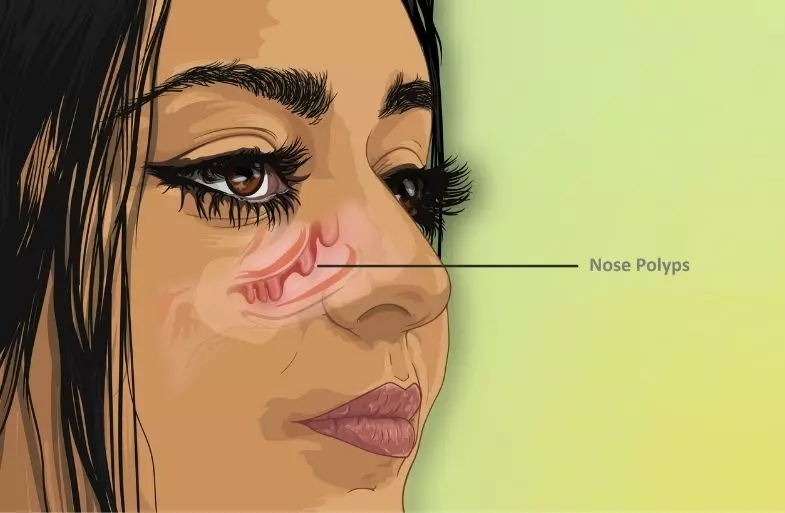What is polyps in nose?
Nasal polyps are soft, benign, multiple, or solitary growths that grow along the nasal mucosa or inside the sinuses.
Polyps can grow to be larger than a grape and can affect breathing if they block the nasal passage. Polyps are often found in people who have allergies or asthma.
Nasal polyps are not harmful and they do not cause any pain or discomfort to the person who has them. They also do not cause any other symptoms such as fever, headache, nasal obstruction, or discharge from the nose.
It is assumed that nasal polyps are the final result of an inflammatory process of the nasal mucosa, in turn, triggered by secondary pathological conditions, such as asthma, recurrent infections, hypersensitivity to some nebulized drugs, allergies, or changes in the immune system.
The curious term “polyp” recalls the aspect assumed by the degenerated nasal-paranasal mucosa on the occasion of this disorder: it appears shiny, clear, and soft, just like a polyp.
A nasal polyp is a soft edematous pedunculated manifestation that can appear in any portion of the nasal mucosa or sinuses. The inflamed nasal mucosa is transformed into a gelatinous texture – similar to that of grapes – and with a translucent and pale appearance, giving rise to an outgrowth known precisely as a polyp.
Nasal polyps are distinguished based on their cellular composition: thus, nasal polyps consisting mainly of neutrophil cells are defined as “neutrophils”, and “eosinophils” when eosinophilic leukocytes are their main components.
Causes of polyps in nose
Polyps in the nose are a common cause of nasal obstruction. Causes of polyps in the nose can include chronic infection, allergic rhinitis, nasal polyposis, sinusitis, and septal deviation.
Polyps can be found on either side of the nasal passage. They are often caused by chronic infection or an allergy to an allergen. Polyps are usually benign but may become malignant if untreated.
Although it is not possible to trace a precise and unambiguous cause, it is assumed that the formation of nasal polyps is related to diseases such as allergy, asthma, cystic fibrosis, chronic sinusitis (especially), immunodeficiency and connective tissue diseases, administration of some drugs, smog.
Symptoms of polyps in nose
The polyp is a small bump that grows from the lining of the nose, sinuses, or throat. It can be caused by allergies, bacteria, viruses, fungi, or other factors. Polyps are common in children and adults who have chronic asthma or allergies. They can also be caused by smoking or secondhand smoke exposure.
Symptoms of nasal polyposis occur when the size of the polyps increases to the point that breathing becomes difficult. In this regard, nasal congestion (stuffy nose) and difficulty in breathing are the two main symptoms of nasal polyposis. The clinical picture is often complemented by several secondary symptoms:
- Altered olfactory capacity (anosmia)
- Change in taste (hypogeusia / ageusia)
- Headache
- Facial pain
- Toothache
- Runny nose (runny nose)
- Watery eyes
- Perception of pressure on the forehead and face
- Itchy eyes
- Snoring
The disease can sometimes be asymptomatic, especially when the size of the nasal polyps is negligible. In severe cases, nasal polyps can give rise to serious complications, such as obstructive sleep apnea, the spread of infection to the eye, meningitis, aneurysms, and asthma attacks.
Given the real risk of a collapse of the clinical picture, it is strongly advised to seek immediate medical advice in case of severe breathing difficulties, double vision, sudden worsening of symptoms, high fever, and significant swelling around the eyes.
However, it should be noted that serious complications from nasal polyposis are quite rare: in the vast majority of cases, small nasal polyps regress spontaneously or with specific drug treatment. Large polyps, on the other hand, require surgical excision.
Diagnosis of polyps in nose
The diagnosis of polyps is not easy to make since they are not visible to the naked eye and it takes a special procedure to detect them. This procedure is called nasal endoscopy and it is performed by inserting a tube with a camera on the end into the nose and looking for polyps.
Among the most validated diagnostic techniques, we mention anamnesis, ENT examination, skin allergy tests, hematological tests, nasal and olfactory respiratory function tests. Imaging (CT or MRI) and endoscopic tests are also sometimes needed.
How to treat polyps in nose?
The polyps usually do not cause any symptoms unless they become infected by bacteria or viruses. If you have nasal polyps, you might experience a stuffy nose, bad breath, or chronic sore throat. You may also have trouble breathing through your nose or find it difficult to swallow.
There are many ways to treat these polyps. Some doctors recommend using saline nasal sprays to shrink the polyps and reduce their size over time. Antibiotics can help with the infection of these polyps too if there is one present. If there is no infection present then antibiotics will not help, and surgery is needed for the removal of the polyp from
Drug therapy (for small polyps): corticosteroid drugs (to be sprayed in the nose or taken by mouth), antihistamines (to treat allergy-dependent nasal polyps), antibiotics or antifungals (in case of bacterial/fungal superinfections)
Surgical Therapy: Polypectomy or Endoscopic Sinus Surgery
Polyps in Nose: How Common Are They?
Although nasal polyps can appear at any age, adults are certainly the most affected category. It is estimated that 2-4% of the global population complain of this disorder, with a clear male prevalence (the male to female ratio is 2/4: 1).
Multiple benign polyposes occur in patients over the age of 20 and are extremely common in males over 40. In children, on the other hand, nasal polyps are a rather rare phenomenon: when they occur in children, it is recommended that the patient be tested for cystic fibrosis. Nasal polyps can recur even after a drug or surgical treatment.
Nasal Polyps: What Are the Causes?
The etiolopathological mechanism of nasal polyposis has not yet been proven with certainty. Although nasal polyposis – for many centuries – has been considered a pathological entity in all respects, it is still not possible to trace a definition based on unambiguous assumptions.
However, most researchers speculate that nasal polyps are the ultimate manifestation of repeated chronic inflammation on the nasal mucosa. For this reason, it is believed possible that some pathological conditions may predispose the patient to nasal polyposis:
- Allergy
- Asthma
- Cystic Fibrosis: Nasal polyps in children are a bright indicator of cystic fibrosis
- Chronic rhinosinusitis/sinusitis (bacterial or fungal)
- Immunodeficiency Diseases:
- Churg-Strauss syndrome: this is a systemic vasculitis affecting the small blood vessels
- Primary ciliary dyskinesia: congenital disease linked to alterations in the structure and function of the cilia of the respiratory mucosa.
- Selective IgA deficiency: rather frequent congenital defect affecting the immune system characterized by the reduction of plasma IgA levels
- Connective tissue diseases (rare)
- Excessive intake of some drugs, especially aspirin and salicylates
- Chronic inhalation of irritants (e.g. smoke, smog)
- Alcohol intolerance
- Infections with Aspergillus, Fusarium, or other molds


